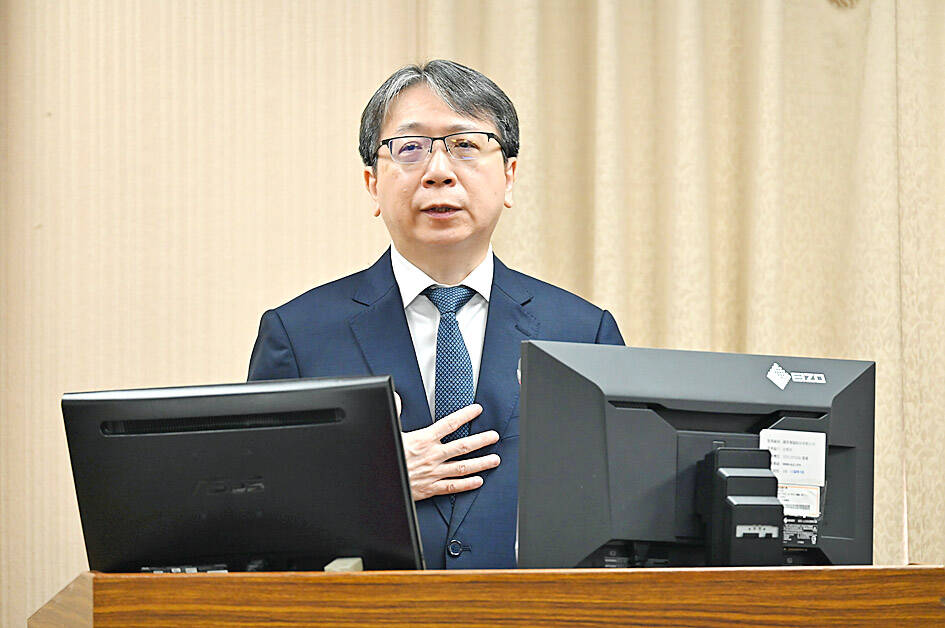Taiwan is monitoring China’s People’s Liberation Army (PLA) exercises for changes in their size or pattern as the nation prepares for president-elect William Lai’s (賴清德) inauguration on May 20, National Security Bureau (NSB) Director-General Tsai Ming-yen (蔡明彥) said yesterday.
Tsai made the comment at a meeting of the Legislative Yuan’s Foreign Affairs and National Defense Committee, in response to Democratic Progressive Party (DPP) Legislator Wang Ting-yu’s (王定宇) questions.
China continues to employ a carrot-and-stick approach, in which it applies pressure with “gray zone” tactics, while attempting to entice Taiwanese with perks, Tsai said.

Photo: Tu Chien-fa, Taipei Times
These actions aim to help Beijing look like it has the initiative in cross-strait affairs, he said.
The NSB will pay close attention to military drills Beijing might conduct and look for signs of change in the size and format of PLA exercises, he said.
An emerging trend for the PLA is to conduct nighttime joint combat readiness patrols with a more sophisticated mixture of aircraft and ships, he said.
It recently conducted three combat readiness patrols at night, in which landing ships, minesweepers and tanker aircraft were used, and performed aerial refueling to increase Chinese airplanes’ loiter time, Tsai said.
Taiwanese armed forces have adopted countermeasures against the observed changes in PLA activities, he said.
China stepped up gray zone incursions, dispatching government-operated ships to the waters near and around Taiwan, Tsai said, citing the incident in Kinmen in February that involved an unmarked Chinese speedboat.
The Chinese boat entered Taiwan’s restricted waters and capsized after colliding with a coast guard boat while fleeing, the Coast Guard Administration reported at the time.
Two of the boat’s four crew drowned. The Chinese sailors did not carry identity papers.
Tsai told a news conference held before the meeting that the PLA regularly schedules many large-scale drills from July to November.
Asked about Chinese People’s Political Consultative Conference Chairman Wang Huning’s (王滬寧) remarks denying the existence of a timetable for invading Taiwan, Tsai said maintaining peace and stability in the Strait is the nation’s most important strategic aim.
Maintaining peace is in the national interest of both sides across the Strait, and Taiwan hopes it can work with China to promote goodwill and reduce the risks of an incident spiraling out of control, he said.

MAKING WAVES: China’s maritime militia could become a nontraditional threat in war, clogging up shipping lanes to prevent US or Japanese intervention, a report said About 1,900 Chinese ships flying flags of convenience and fishing vessels that participated in China’s military exercises around Taiwan last month and in January last year have been listed for monitoring, Coast Guard Administration (CGA) Deputy Director-General Hsieh Ching-chin (謝慶欽) said yesterday. Following amendments to the Commercial Port Act (商港法) and the Law of Ships (船舶法) last month, the CGA can designate possible berthing areas or deny ports of call for vessels suspected of loitering around areas where undersea cables can be accessed, Oceans Affairs Council Minister Kuan Bi-ling (管碧玲) said. The list of suspected ships, originally 300, had risen to about

DAREDEVIL: Honnold said it had always been a dream of his to climb Taipei 101, while a Netflix producer said the skyscraper was ‘a real icon of this country’ US climber Alex Honnold yesterday took on Taiwan’s tallest building, becoming the first person to scale Taipei 101 without a rope, harness or safety net. Hundreds of spectators gathered at the base of the 101-story skyscraper to watch Honnold, 40, embark on his daredevil feat, which was also broadcast live on Netflix. Dressed in a red T-shirt and yellow custom-made climbing shoes, Honnold swiftly moved up the southeast face of the glass and steel building. At one point, he stepped onto a platform midway up to wave down at fans and onlookers who were taking photos. People watching from inside

Japan’s strategic alliance with the US would collapse if Tokyo were to turn away from a conflict in Taiwan, Japanese Prime Minister Sanae Takaichi said yesterday, but distanced herself from previous comments that suggested a possible military response in such an event. Takaichi expressed her latest views on a nationally broadcast TV program late on Monday, where an opposition party leader criticized her for igniting tensions with China with the earlier remarks. Ties between Japan and China have sunk to the worst level in years after Takaichi said in November that a hypothetical Chinese attack on Taiwan could bring about a Japanese

STREAMLINED: The dedicated funding would allow the US to transfer equipment to Taiwan when needed and order upgraded replacements for stockpiles, a source said The US House of Representatives on Thursday passed a defense appropriations bill totaling US$838.7 billion, of which US$1 billion is to be allocated to reinforcing security cooperation with Taiwan and US$150 million to replace defense articles provided to the nation. These are part of the Consolidated Appropriation Act, which the US House yesterday passed with 341 votes in favor and 88 against. The act must be passed by the US Senate before Friday next week to avoid another government shutdown. The US House Committee on Appropriations on Monday unveiled the act, saying that it allocates US$1 billion for the Taiwan Security Cooperation Initiative